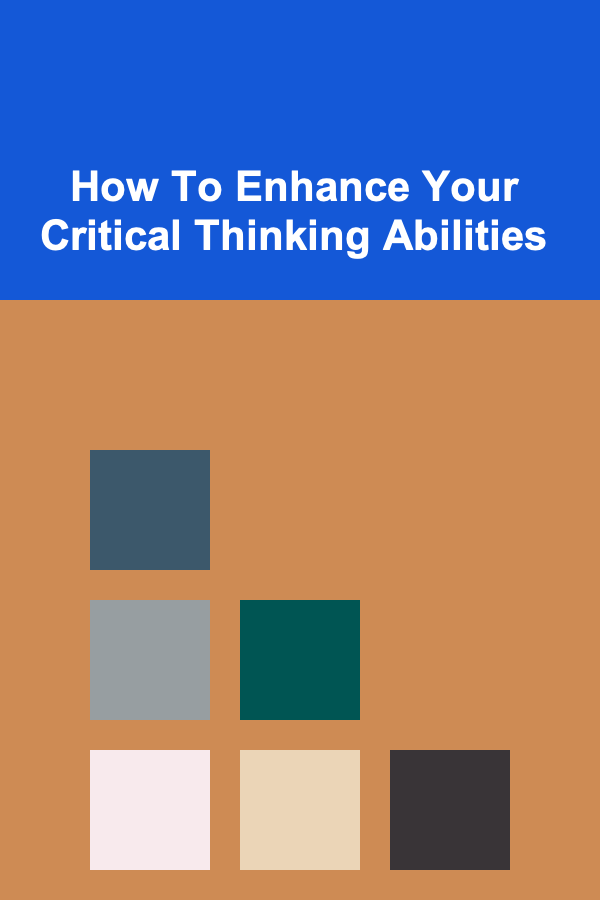
How To Enhance Your Critical Thinking Abilities
ebook include PDF & Audio bundle (Micro Guide)
$12.99$7.99
Limited Time Offer! Order within the next:

Critical thinking is a vital skill in today's fast-paced, information-saturated world. It involves analyzing facts, evaluating arguments, and making reasoned judgments based on logic and evidence. Developing strong critical thinking skills not only enhances decision-making but also improves problem-solving abilities, boosts creativity, and fosters a deeper understanding of complex issues. This article will explore the importance of critical thinking, the steps to enhance it, and how to apply it in various aspects of life.
What is Critical Thinking?
Critical thinking is the ability to think clearly and rationally about what to do or believe. It requires being open-minded, inquisitive, and skeptical of claims that are not supported by strong evidence. Critical thinkers do not simply accept information at face value; they ask questions, evaluate evidence, consider multiple perspectives, and draw conclusions based on logical reasoning.
Key aspects of critical thinking include:
- Analysis: Breaking down complex issues into manageable parts.
- Evaluation: Assessing the credibility and validity of information.
- Inference: Drawing conclusions based on evidence.
- Reasoning: Connecting ideas logically to form a coherent argument.
- Problem-solving: Identifying solutions to challenges using evidence and logic.
The Importance of Critical Thinking
In an era dominated by rapid technological advancements and vast amounts of information, critical thinking has never been more essential. Here's why it is crucial:
- Informed Decision-Making: Whether in personal life or in professional settings, making decisions based on logical reasoning and evidence ensures better outcomes. It helps avoid impulsive decisions based on bias or emotions.
- Problem Solving: Critical thinkers are equipped to solve problems more effectively. They analyze all available information, consider different options, and implement solutions based on rational thinking.
- Avoiding Manipulation: In today's world, misinformation and manipulation are rampant, particularly through social media. Critical thinking allows individuals to assess the truthfulness of the information they encounter, reducing the risk of being misled.
- Improved Communication: Critical thinking enhances one's ability to communicate more effectively, whether in writing or conversation. By evaluating arguments and presenting evidence, critical thinkers can engage in more meaningful and productive discussions.
- Personal Growth: Critical thinking fosters self-awareness. It encourages questioning one's assumptions and beliefs, leading to personal growth and development.
Now that we understand what critical thinking is and why it's important, let's explore the ways you can enhance your critical thinking abilities.
Strategies to Enhance Critical Thinking
1. Engage in Active Reading and Listening
Critical thinking starts with the information you consume. Whether reading a book, article, or listening to a podcast, it's important to engage actively with the content.
- Question What You Read or Hear: Don't passively absorb information. Ask yourself questions like: What is the author's main argument? What evidence do they provide? Is there any bias? Are there alternative viewpoints to consider?
- Look for Gaps in the Argument: A critical reader identifies weaknesses or gaps in an argument. Are there points that are unsupported or under-explained? Are there logical inconsistencies?
- Take Notes and Summarize: Jot down key points and try to summarize the content in your own words. This helps reinforce understanding and enables you to identify any areas that need further analysis.
2. Practice Problem-Solving
One of the best ways to develop critical thinking is through regular practice. Engaging in problem-solving exercises helps build your analytical and reasoning abilities.
- Tackle Complex Problems: Don't shy away from problems that seem difficult. Start with a challenge and break it down into smaller parts. Consider various solutions before choosing the best one.
- Use the "Five Whys" Technique: Ask "Why?" multiple times to dig deeper into a problem. This approach helps uncover the root cause of issues, rather than just addressing the symptoms.
- Think in Different Perspectives: Approach the problem from multiple angles. How would someone from a different background, discipline, or experience view the situation? This broadens your thinking and helps you find creative solutions.
3. Engage in Discussions and Debates
Engaging in discussions with others is an excellent way to develop critical thinking skills. Debating forces you to clarify your ideas, defend your position, and consider opposing viewpoints.
- Argue Constructively: When engaging in debates, focus on understanding the other person's perspective instead of just trying to win the argument. Present your ideas logically and be open to changing your mind if presented with stronger evidence.
- Seek Out Diverse Perspectives: In discussions, interact with people who have different views and backgrounds. This can challenge your assumptions and broaden your understanding of various issues.
- Don't Be Afraid to Challenge Ideas: Critically evaluating ideas is not about being confrontational. It's about fostering a deeper understanding of the topic by asking tough questions and seeking evidence to support claims.
4. Analyze Your Own Thinking
Self-reflection is crucial for enhancing critical thinking. Being aware of your cognitive biases and thought patterns can help you improve the way you approach problems and make decisions.
- Recognize Cognitive Biases: Everyone has biases---whether it's confirmation bias, anchoring bias, or availability bias. Being aware of these biases helps you think more objectively and make better judgments.
- Consider Your Assumptions: We all make assumptions based on our experiences, culture, and upbringing. Critical thinkers regularly challenge their assumptions to ensure they are grounded in evidence and reason.
- Maintain an Open Mind: Be willing to change your views when presented with new evidence. The ability to change your mind is a key aspect of critical thinking.
5. Cultivate Curiosity and Open-Mindedness
Curiosity is at the heart of critical thinking. To be an effective critical thinker, you must be inquisitive and open to exploring new ideas, facts, and perspectives.
- Ask Questions: Cultivate the habit of asking questions. Whether you're reading a news article or listening to a podcast, always think: What is missing from this picture? What other factors could be influencing this issue?
- Be Open to New Ideas: Challenge yourself to consider new ideas, even if they seem counterintuitive or unfamiliar. By doing so, you expand your knowledge and enhance your ability to think critically.
6. Use Logic and Reasoning Tools
Critical thinking is based on logical reasoning. Learning how to structure your arguments and reasoning is essential to thinking critically.
- Use the Socratic Method: This involves asking a series of probing questions to stimulate critical thinking and illuminate ideas. The Socratic method challenges individuals to explore their reasoning and justify their positions.
- Apply Logic to Analyze Arguments: Understand the basics of logical fallacies, such as ad hominem attacks, false dilemmas, and straw man arguments. By recognizing these fallacies, you can assess the validity of an argument more accurately.
- Work with Evidence: Always seek out strong evidence to support your arguments. Facts, statistics, and well-reasoned analysis are the building blocks of critical thinking.
7. Reflect and Seek Feedback
Critical thinking improves when we reflect on our thought processes and seek feedback from others. Regular reflection allows you to fine-tune your thinking and identify areas for improvement.
- Keep a Journal: Writing down your thoughts can help clarify your reasoning. Review your journal regularly to identify patterns in your thinking and discover areas where you can improve.
- Seek Constructive Criticism: Ask for feedback from trusted individuals who can challenge your ideas and offer new perspectives. Constructive criticism can help you refine your thinking and strengthen your arguments.
8. Read Widely and Diversely
Reading a wide range of materials broadens your understanding of different topics and perspectives. The more diverse your reading material, the more you expose yourself to new ideas and challenges that can stimulate critical thinking.
- Read Beyond Your Comfort Zone: Don't just read what aligns with your current beliefs and interests. Challenge yourself to explore topics outside your field or beliefs, as this promotes cognitive flexibility.
- Expose Yourself to Different Genres: Fiction, non-fiction, philosophy, history, science---reading across genres and disciplines enhances your ability to see connections between different fields and think more creatively.
9. Practice Mindfulness
Mindfulness, the practice of being fully present and aware, can enhance your critical thinking skills by improving your focus and reducing impulsive reactions.
- Focus on the Present Moment: When tackling a problem or evaluating information, eliminate distractions and focus solely on the task at hand. Mindfulness increases your ability to think clearly and logically.
- Stay Calm Under Pressure: In high-pressure situations, mindfulness can help you remain calm and make more thoughtful decisions, rather than reacting impulsively.
10. Apply Critical Thinking to Everyday Life
Finally, critical thinking should not be confined to academic or professional settings. Apply it to your everyday life to improve decision-making, personal growth, and problem-solving.
- Use Critical Thinking in Personal Decisions: Whether it's choosing a career path, making a financial decision, or handling relationships, critical thinking helps you assess your options and make the best choices.
- Evaluate the World Around You: In a world filled with information overload, critical thinking helps you navigate news, social media, and advertisements more effectively.
Conclusion
Enhancing your critical thinking abilities is a lifelong process that requires dedication, practice, and a willingness to challenge your assumptions. By adopting strategies such as engaging in active reading, practicing problem-solving, participating in discussions, analyzing your own thinking, and cultivating curiosity, you can strengthen your critical thinking skills. The ability to think critically is a valuable asset in every area of life, from personal decision-making to professional success. As you continue to develop your critical thinking abilities, you will become a more informed, rational, and effective individual, better equipped to navigate the complexities of the modern world.

How to Maintain Your Pet's Grooming Routine Between Visits to the Salon
Read More
What Are the Best Tips for Organizing Your Jewelry Collection?
Read More
How to Maintain a Healthy Eating Lifestyle Long-Term
Read More
How to Prepare Your Home for Holiday Guests: A Checklist
Read More
How to Crochet a Scarf: A Cozy Project Checklist
Read More
How to Create a Blog Planner for Seasonal Content
Read MoreOther Products

How to Maintain Your Pet's Grooming Routine Between Visits to the Salon
Read More
What Are the Best Tips for Organizing Your Jewelry Collection?
Read More
How to Maintain a Healthy Eating Lifestyle Long-Term
Read More
How to Prepare Your Home for Holiday Guests: A Checklist
Read More
How to Crochet a Scarf: A Cozy Project Checklist
Read More